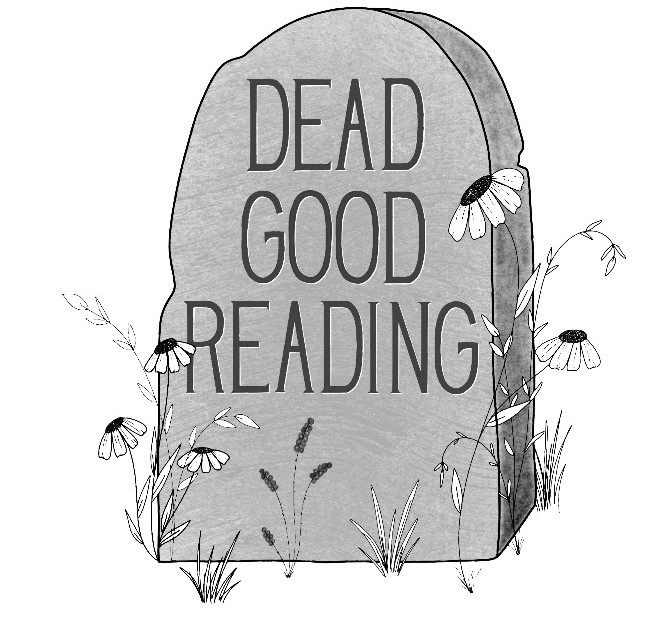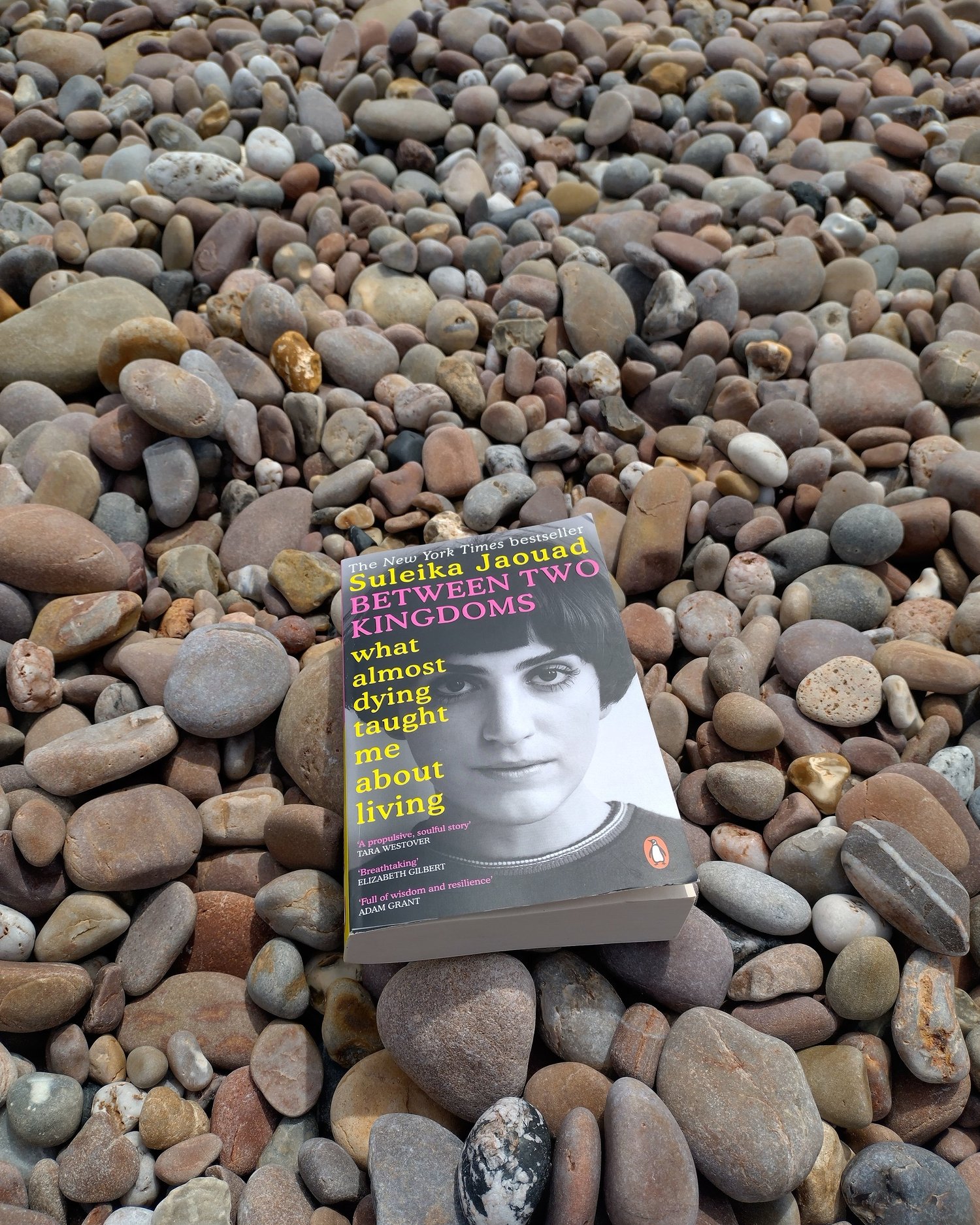In Between Two Kingdoms: what almost dying has taught me about living Suleika Jaouad reflects on being diagnosed with cancer at a mere 22. Being a twenty-something, cancer was definitely not on her mind. When she started to experience strange bodily sensations and itching it, perhaps unsurprisingly, took quite a while to get diagnosed with cancer. When finally diagnosed with leukaemia, Jaouad was told that she had a 35 per cent chance of survival. That’s not a big number.
Picture of Between Two Kingdoms taken at Sidmouth Beach.
“With mortality in the balance, one of life’s most delicious activities when you’re young – imagining your future- had become a frightening, despair-inducing exercise. The future had once seemed infinite with possibility. Now it was shrouded in doom, a dark space ahead filled only with the promise of more poisonous treatments and terrifying unknowns ”
— Jaouad Page: 90-91
Between Two Kingdoms is an account of Jaouad’s journey receiving a cancer diagnosis, and the subsequent treatment. It is simultaneously a reflection on how to make sense of life after cancer. The book can roughly be divided in two parts. Part one is the journey to a cancer diagnosis and all the treatments. Part two is the ‘what comes next’.
Jaouad was forewarned by a fellow cancer patient that she would need to prepare herself for life after cancer. With a 35 percent chance of survival, thinking about long-term survival was near impossible. At the time she could not perceive herself to move beyond cancer, to continue life as someone without an illness. So when ‘cancer free’ became a reality, it was indeed difficult to return to the land of the living.
The title ‘Between two kingdoms’ refers to Susan Sontag’s seminal essay Illness as Metaphor. Sontag writes:
“Everyone who is born holds dual citizenship, in the kingdom of the well and in the kingdom of the sick. Although we all prefer to use only the good passport, sooner or later each of us is obliged, at least for a spell, to identify ourselves as citizens of that other place”
— Sontag in: Illness as Metaphor
Jaouad, for a long time, was a citizen of the kingdom of illness. For years she had to undergo numerous treatments. For a long time she lived in a bubble in a hospital, as her immune system was heavily compromised. In a very small space she had to make sense of what it meant to be a cancer patient in her early twenties. She writes candidly and honestly about her experience with cancer, and the impact it has had on not only herself, but her relationships, both romantically and familial; the pressures placed on her brother as he was a perfect match as a bone marrow donor, the strange mix of being both a patient and a desirable person in your relationship and how cancer makes having sex more difficult.
At various points in her cancer journey, it was obvious Jaouad was not a ‘typical’ patient as, for example, cancer specialists omitted to inform her that her treatment would cause infertility. Doing her own research online, she discovered that infertility was a common ‘side-effect’, and quickly realised that her doctors were used to treating patients that were chronologically much older, and therefore likely not worried about having children. Yet, Jaouad was arguably still at the start of her life and although she felt the imminent threat of dying prematurely, she liked to keep the option of biological motherhood open.
The subtitle ‘what almost dying taught me about living’ speaks to cancer often being considered a ‘teachable moment’. In the article Remaking the Self: Trauma, Teachable Moments, and the Biopolitics of Cancer Survivorship anthropologist Kirsten Bell discusses how the notion of “a teachable moment” has infiltrated the cancer discourse, as a diagnosis is often seen as a prompt to improve health-related behaviours. Bell suggests that
“cancer is increasingly seen to present a unique opportunity to catalyze the patient’s physical and psychological development. In this framework, the patient can no longer be relied upon to transform him or herself: this change must be externally driven, with clinicians taking advantage of the trauma that cancer entails to kick-start the patient into action”
— Bell
Jaouad’s account of a younger person’s experience of cancer shows how the notion of an externally driven teachable moment falls short, as she very much is driven to transform herself and to reimagine her survival as a creative act. But the argument that cancer is seen as a “teachable moment”, both by patients as well as healthcare professionals is clearly present in Jaouad’s narrative.
Inspired by artists like Frida Kahlo, who similarly have experienced ill health, she was set to use her cancer journey in a creative way.
“‘I was no Frida Kahlo, of course, so it was still difficult for me to imagine how I might creatively engage with my own misfortune. But her story had ignited something inside of me. I began to research the long lineage of bedridden artists and writers who alchemized their suffering into creative grist”
— Jaouad Page:108
Her medium of choice was the written word. Perhaps her cancer journey was transformed by her writing, but the opposite might also be true; perhaps her writing transformed her cancer journey. She was successful in getting a column in the New York Times entitled Life interrupted. This a series of columns in which she chronicles her experience of being a cancer patient as a young adult. The column strikes a chord with many people and Jaouad receives many letters from readers.
Having death lingering at her doorstop for so many years returning to the kingdom of wellbeing is difficult. Jaouad fears that the cancer might return at any given point, which makes it hard to return to ‘normal’. Rather, she finds herself in a liminal stage betwixt and between the two kingdoms, not fully sure whether she belongs in either. In the book she describes the notion of 100 days projects or, in other words, something you do for 100 consecutive days. She gives different examples of projects she and her family did whilst she had cancer, but trying to relearn how to live she decides to visit some of the people that wrote her letters. What follows is a beautiful road trip, which can again be read as one long teachable moment.
“Death never comes at a good time, but getting a death sentence when you’re young is a breach of contract with the natural order of things. After years of being sick, Melissa and I had learned to coexist with the threat of death as best we could. Mortality was a stench we couldn’t wash off, no matter how hard we tried’ ”
— Jaouad Page:189
Between the Kingdoms was a powerful read which I enjoyed reading in my recent trip to the UK. Parts of it I read early mornings in Cornwall, whilst my beloved friend Beth would bring me cups of coffee in bed. Parts of it I read on a beach in Sidmouth, Devon and parts of it I read on my train journey back to the airport. Jaouad. While the narrative I have described might not seem surprising; woman gets cancer and woman subsequently survives it the writing throughout is engaging and moving and I didn’t want the book to end. The transition form younger person with cancer to younger person surviving cancer is powerful and I can understand why so many people felt compelled to write Jaouad after reading her columns.
Between the Kingdoms will speak to people interested in illness, cancer and the boundaries between living and dying. It also shows the value of creativity when confronted with a poor prognosis and the beauty and support art can give when making sense of uncertainty.


Leave a Reply